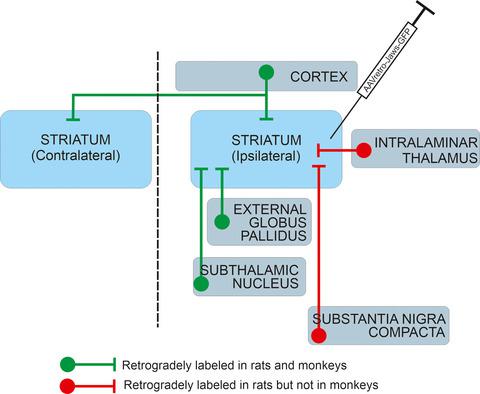当前位置:
X-MOL 学术
›
Eur. J. Nerosci.
›
论文详情
Our official English website, www.x-mol.net, welcomes your feedback! (Note: you will need to create a separate account there.)
Comparative analyses of transgene expression patterns after intra‐striatal injections of rAAV2‐retro in rats and rhesus monkeys: A light and electron microscopic study
European Journal of Neroscience ( IF 3.4 ) Pub Date : 2020-10-28 , DOI: 10.1111/ejn.15027 Daniel L Albaugh 1, 2 , Yoland Smith 1, 2, 3 , Adriana Galvan 1, 2, 3
European Journal of Neroscience ( IF 3.4 ) Pub Date : 2020-10-28 , DOI: 10.1111/ejn.15027 Daniel L Albaugh 1, 2 , Yoland Smith 1, 2, 3 , Adriana Galvan 1, 2, 3
Affiliation

|
Retrogradely‐transducing viral vectors are versatile tools for anatomical and functional interrogations of neural circuits. These vectors can be applied in nonhuman primates (NHPs), powerful model species for neuroscientific studies with limited genetic tractability, but limited data are available regarding the tropism and transgene expression patterns of such viruses after injections in NHP brains. Consequently, NHP researchers must often rely on related data available from other species for experimental planning. To evaluate the suitability of rAAV2‐retro in the NHP basal ganglia, we studied the transgene expression patterns at the light and electron microscope level after injections of rAAV2‐retro vector encoding the opsin Jaws conjugated to a green fluorescent protein (GFP) in the putamen of rhesus macaques. For inter‐species comparison, we injected the same vector in the rat dorsal striatum. In both species, GFP expression was observed in numerous cortical and subcortical regions with known striatal projections. However, important inter‐species differences in pathway transduction were seen, including labeling of the intralaminar thalamostriatal projection in rats, but not monkeys. Electron microscopic ultrastructural observations within the basal ganglia revealed GFP labeling in both postsynaptic dendrites and presynaptic axonal terminals; the latter likely derived from anterograde transgene transport in neurons that project to the striatum, and from collaterals of these neurons. Our results suggest that certain neural pathways may be refractory to transduction by retrograde vectors in a species‐specific manner, highlighting the need for caution when determining the suitability of a retrograde vector for NHP studies based solely on rodent data.
中文翻译:

大鼠和恒河猴纹状体内注射 rAAV2-retro 后转基因表达模式的比较分析:光和电子显微镜研究
逆行转导病毒载体是神经回路解剖和功能检查的通用工具。这些载体可应用于非人类灵长类动物 (NHP),这是用于神经科学研究的强大模型物种,其遗传易处理性有限,但关于此类病毒在 NHP 大脑中注射后的趋向性和转基因表达模式的可用数据有限。因此,NHP 研究人员必须经常依赖其他物种提供的相关数据进行实验规划。为了评估 rAAV2-retro 在 NHP 基底神经节中的适用性,我们在注射 rAAV2-retro 载体后在光学和电子显微镜水平研究了转基因表达模式,该载体编码与壳核中的绿色荧光蛋白 (GFP) 结合的视蛋白颚恒河猴。对于种间比较,我们在大鼠背侧纹状体中注射了相同的载体。在这两个物种中,在具有已知纹状体投影的许多皮质和皮质下区域中都观察到了 GFP 表达。然而,在通路转导方面发现了重要的种间差异,包括在大鼠而非猴子中标记了椎板内丘纹纹突。基底神经节内的电子显微镜超微结构观察揭示了突触后树突和突触前轴突末端的 GFP 标记;后者可能来自投射到纹状体的神经元中的顺行转基因转运,以及这些神经元的侧枝。我们的结果表明,某些神经通路可能对逆行载体以物种特异性方式进行转导具有抵抗力,
更新日期:2020-12-31
中文翻译:

大鼠和恒河猴纹状体内注射 rAAV2-retro 后转基因表达模式的比较分析:光和电子显微镜研究
逆行转导病毒载体是神经回路解剖和功能检查的通用工具。这些载体可应用于非人类灵长类动物 (NHP),这是用于神经科学研究的强大模型物种,其遗传易处理性有限,但关于此类病毒在 NHP 大脑中注射后的趋向性和转基因表达模式的可用数据有限。因此,NHP 研究人员必须经常依赖其他物种提供的相关数据进行实验规划。为了评估 rAAV2-retro 在 NHP 基底神经节中的适用性,我们在注射 rAAV2-retro 载体后在光学和电子显微镜水平研究了转基因表达模式,该载体编码与壳核中的绿色荧光蛋白 (GFP) 结合的视蛋白颚恒河猴。对于种间比较,我们在大鼠背侧纹状体中注射了相同的载体。在这两个物种中,在具有已知纹状体投影的许多皮质和皮质下区域中都观察到了 GFP 表达。然而,在通路转导方面发现了重要的种间差异,包括在大鼠而非猴子中标记了椎板内丘纹纹突。基底神经节内的电子显微镜超微结构观察揭示了突触后树突和突触前轴突末端的 GFP 标记;后者可能来自投射到纹状体的神经元中的顺行转基因转运,以及这些神经元的侧枝。我们的结果表明,某些神经通路可能对逆行载体以物种特异性方式进行转导具有抵抗力,

























 京公网安备 11010802027423号
京公网安备 11010802027423号